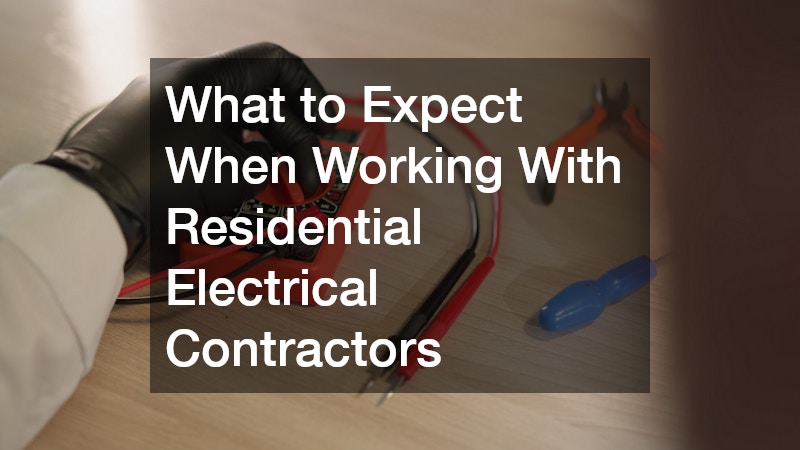
In this article, we will explore the various expectations and considerations when working with residential electrical contractors. Understanding the process can help homeowners make informed decisions and ensure that their electrical needs are met safely and efficiently.
1. What Qualifications Should I Look for in a Residential Electrical Contractor?
When seeking a residential electrical contractor, it’s crucial to assess their qualifications to ensure you have a skilled professional working on your home. Look for those who possess the necessary certifications and licenses required by your local regulations. These qualifications often indicate that the contractor has undergone the necessary training and possesses a thorough understanding of electrical systems.
Additionally, consider the contractor’s experience within the industry. A well-established contractor with several years of experience is likely to have a deeper knowledge of common electrical issues and effective solutions. It’s also beneficial to verify that they specialize in residential projects, as residential work can differ significantly from commercial electrical projects.
2. How Much Should I Expect to Pay for Electrical Services?
Understanding the cost associated with hiring a residential electrical contractor is essential for budgeting purposes. While the price can vary widely depending on factors such as the complexity of the project and the contractor’s experience, it is helpful for homeowners to request multiple quotes before making a decision. These estimates can give you a clearer picture of what to expect.
Labor costs typically constitute a significant portion of the total expense; however, material costs and permits necessary for the work can add to the bottom line. Be sure to ask your contractor for a detailed breakdown of the estimate, which will help you identify where costs are being allocated and if the pricing is reasonable compared to industry standards.
3. What Types of Electrical Projects Can a Residential Contractor Handle?
Residential electrical contractors are equipped to handle a diverse range of projects within your home. Common tasks include installations, repairs, and upgrades to lighting, outlets, circuit breakers, and wiring systems. Whether you’re renovating a room, working on a luxury home remodeling project, or simply updating fixtures, these contractors are trained to ensure that the work complies with safety codes.
In addition to routine projects, many contractors can perform specialized work such as installing home automation systems, landscape lighting, or electric car charging stations. Understanding the range of services available will enable homeowners to choose a contractor that fits their specific needs.
It’s always wise to discuss your project in detail with potential contractors to assess their capabilities and ensure they are comfortable tackling your desired electrical tasks. A reputable contractor will be transparent about their skills and expertise when it comes to the specific project you have in mind.
4. How Do I Determine If a Contractor Is Licensed and Insured?
Before hiring a residential electrical contractor, verifying their licensing and insurance is crucial. A license demonstrates that the contractor has met the legal requirements set by your local government, ensuring they have the appropriate training and knowledge to carry out electrical work safely. Most states have a database where you can confirm a contractor’s licensing status.
Insurance is equally important, as it protects you from liability should any accidents or damages occur during the project. You can ask the contractor directly for proof of insurance, but you may also want to contact their insurance company to verify that the policy is current and covers both liability and worker’s compensation.
5. What Is the Typical Timeline for Electrical Projects?
The timeline for electrical projects can vary significantly based on the scope and complexity of the work. Smaller jobs, such as replacing fixtures or outlets, may only take a few hours, while larger renovations requiring extensive wiring or modifications could span several days or weeks. Homeowners should discuss timelines in detail with their contractor to set realistic expectations.
Preparation can also impact the timeline. If the project requires permits or inspections, these can add time depending on local regulations and availability. Ask your contractor about these factors during the planning phase to avoid surprises later on.
Communication is essential throughout the project. A good contractor will provide regular updates and notify you of any potential delays. Being informed will help you better manage your schedule and any disruptions that may arise during the electrical work, ensuring a smoother process.
6. How Can I Ensure Quality Work from My Contractor?
To guarantee the quality of work from your residential electrical contractor, start by setting clear expectations at the outset of the project. Discuss your goals, preferences, and any specific requirements you may have. Regular communication and openness throughout the process can help ensure alignment and satisfaction.
Requesting written contracts and detailed project scopes is also vital. This documentation should outline the work to be performed, materials to be used, costs, and deadlines. Having everything in writing provides a reference point should any issues arise and helps maintain accountability on both sides.
Working with residential electrical contractors can be a rewarding experience if you know what to expect. By understanding qualifications, costs, project types, licensing, timelines, and quality assurance, homeowners can navigate the electrical contracting process with confidence.




